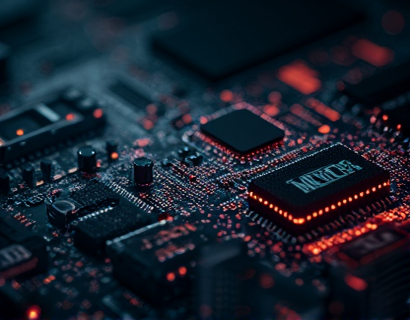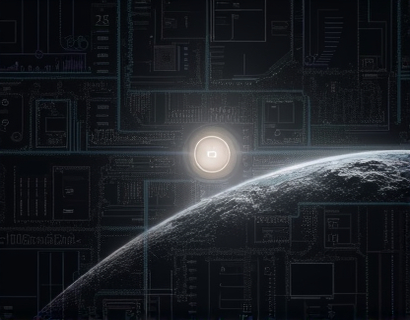Decentralized Innovation: Unlocking Global Collaboration and Ecosystem Growth for Blockchain Communities
The rise of blockchain technology has ushered in a new era of decentralized innovation, fundamentally transforming how communities collaborate, innovate, and govern themselves. As blockchain enthusiasts and innovators seek to harness the power of decentralized networks, the need for comprehensive platforms that facilitate collaboration and enhance governance becomes increasingly critical. This article explores the transformative potential of decentralized networks and how they can drive global efficiency and scalability for blockchain communities.
The Essence of Decentralization
Decentralization refers to the distribution of authority, control, and decision-making across a network rather than being concentrated in a single entity. In the context of blockchain, decentralization enables participants to engage directly with one another, fostering transparency, trust, and security. This shift away from traditional centralized systems allows for greater innovation and collaboration, as individuals and organizations can contribute to and benefit from a shared ecosystem.
Understanding Blockchain Communities
Blockchain communities consist of individuals, developers, organizations, and enthusiasts who share a common interest in blockchain technology and its applications. These communities are often characterized by their commitment to open-source principles, collaboration, and the pursuit of decentralized solutions. By leveraging the collective knowledge and resources of their members, blockchain communities can drive innovation and create value for all participants.
The Role of Comprehensive Platforms
Comprehensive platforms play a crucial role in enhancing collaboration, innovation, and governance within blockchain communities. These platforms provide the necessary tools and infrastructure for members to connect, share resources, and participate in decision-making processes. By offering a centralized hub for collaboration, comprehensive platforms can streamline communication, facilitate knowledge sharing, and promote active engagement among community members.
Key Features of Comprehensive Platforms
- Collaboration Tools: Comprehensive platforms should offer a suite of collaboration tools that enable members to work together effectively. This may include features such as discussion forums, project management tools, and real-time communication channels.
- Resource Sharing: A successful platform allows members to share resources, including code, documentation, and best practices. This fosters a culture of learning and innovation, as members can build upon each other's work.
- Governance Mechanisms: Effective governance is essential for the sustainability of decentralized networks. Comprehensive platforms should provide mechanisms for community members to participate in decision-making processes, ensuring that all voices are heard and considered.
- Incentive Structures: To encourage participation and contribution, platforms should implement incentive structures that reward members for their engagement. This could include token-based rewards, recognition programs, or access to exclusive resources.
- Education and Training: Comprehensive platforms should prioritize education and training, offering resources and programs that help members develop their skills and knowledge in blockchain technology and decentralized innovation.
Enhancing Collaboration Through Decentralized Networks
Decentralized networks inherently promote collaboration by enabling direct interactions among participants. Unlike traditional centralized systems, where communication often flows through intermediaries, decentralized networks allow for peer-to-peer connections. This direct engagement fosters a sense of community and encourages members to collaborate on projects, share ideas, and support one another.
Building Trust and Transparency
Trust and transparency are fundamental principles of decentralized networks. By leveraging blockchain technology, participants can verify transactions and interactions without relying on a central authority. This transparency builds trust among community members, as they can independently validate the integrity of the network. As trust grows, so does the willingness of individuals to collaborate and innovate together.
Encouraging Diverse Perspectives
Decentralized networks attract a diverse range of participants, each bringing unique perspectives and expertise. This diversity is a powerful driver of innovation, as it encourages creative problem-solving and the exploration of new ideas. Comprehensive platforms can facilitate this diversity by providing spaces for members to share their insights, collaborate on projects, and learn from one another.
Driving Innovation in Blockchain Communities
Innovation is at the heart of blockchain technology, and decentralized networks provide the ideal environment for fostering new ideas and solutions. By breaking down traditional barriers to entry, decentralized networks empower individuals and organizations to experiment, iterate, and develop innovative applications.
Rapid Prototyping and Iteration
Decentralized networks enable rapid prototyping and iteration, allowing developers to test and refine their ideas quickly. With access to a global pool of talent and resources, innovators can collaborate on projects, gather feedback, and make improvements in real-time. This agile approach to development accelerates the innovation process and leads to the creation of more robust and effective solutions.
Open-Source Development
Open-source development is a cornerstone of many blockchain communities. By making code publicly available, developers can collaborate on projects, contribute to existing solutions, and build upon one another's work. This collaborative approach not only accelerates innovation but also ensures that solutions are transparent, secure, and accessible to all.
Governance in Decentralized Networks
Effective governance is essential for the long-term success of decentralized networks. As these networks grow and evolve, establishing clear governance structures becomes increasingly important to ensure that all members have a voice in decision-making processes.
Decentralized Autonomous Organizations (DAOs)
Decentralized Autonomous Organizations (DAOs) are a popular governance model within blockchain communities. DAOs operate on smart contracts, allowing members to participate in decision-making processes through voting mechanisms. This decentralized approach to governance empowers community members to influence the direction of the network and ensures that decisions are made collectively.
Consensus Mechanisms
Consensus mechanisms are critical to the governance of decentralized networks. These mechanisms determine how decisions are made and how participants reach agreement on the state of the network. Various consensus models, such as Proof of Work, Proof of Stake, and Delegated Proof of Stake, offer different approaches to governance, each with its own advantages and challenges.
Global Efficiency and Scalability
One of the primary benefits of decentralized networks is their potential for global efficiency and scalability. By eliminating intermediaries and streamlining processes, decentralized networks can operate more efficiently than traditional systems.
Reducing Transaction Costs
Decentralized networks can significantly reduce transaction costs by eliminating the need for intermediaries. This cost reduction makes it easier for individuals and organizations to participate in the network, driving greater engagement and collaboration.
Scalability Through Distributed Architecture
The distributed architecture of decentralized networks allows them to scale more effectively than centralized systems. As more participants join the network, the capacity for processing transactions and interactions increases, enabling the network to grow organically without the limitations of a central authority.
Challenges and Considerations
While decentralized networks offer numerous benefits, they also present challenges that must be addressed to ensure their success. Understanding these challenges is essential for blockchain communities seeking to harness the power of decentralization.
Security Concerns
Security is a critical concern for decentralized networks. While blockchain technology offers enhanced security features, vulnerabilities can still exist, particularly in smart contracts and network protocols. Communities must prioritize security measures and conduct thorough audits to mitigate risks.
Regulatory Compliance
As decentralized networks continue to gain traction, regulatory compliance becomes increasingly important. Communities must navigate complex legal landscapes and ensure that their operations align with local regulations. This may require collaboration with legal experts and policymakers to establish clear guidelines for decentralized innovation.
Community Engagement
Maintaining active community engagement is essential for the sustainability of decentralized networks. Communities must foster a culture of participation and collaboration, encouraging members to contribute their skills and knowledge. This can be achieved through regular communication, events, and educational initiatives.
The Future of Decentralized Innovation
The future of decentralized innovation is bright, with the potential to revolutionize industries and empower individuals worldwide. As blockchain technology continues to evolve, comprehensive platforms that facilitate collaboration, innovation, and governance will play a pivotal role in shaping the future of decentralized networks.
Emerging Trends
Several emerging trends are poised to impact the landscape of decentralized innovation. These include the rise of decentralized finance (DeFi), non-fungible tokens (NFTs), and the integration of artificial intelligence (AI) with blockchain technology. Each of these trends presents unique opportunities for collaboration and innovation within blockchain communities.
Empowering Future Generations
As decentralized networks continue to grow, it is essential to empower future generations of blockchain enthusiasts and innovators. This can be achieved through education, mentorship, and access to resources that enable individuals to explore the potential of decentralized technology. By fostering a culture of innovation and collaboration, communities can ensure that the benefits of decentralization are accessible to all.
Conclusion
Decentralized innovation has the potential to unlock global collaboration and drive ecosystem growth for blockchain communities. By leveraging comprehensive platforms that enhance collaboration, innovation, and governance, blockchain enthusiasts and innovators can work together to create a more efficient and scalable future. As we continue to explore the possibilities of decentralized networks, it is essential to prioritize community engagement, security, and regulatory compliance to ensure the long-term success of these transformative technologies.











































